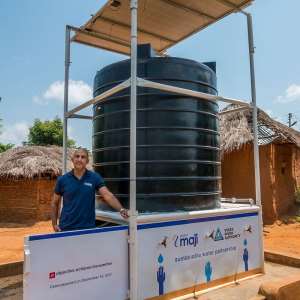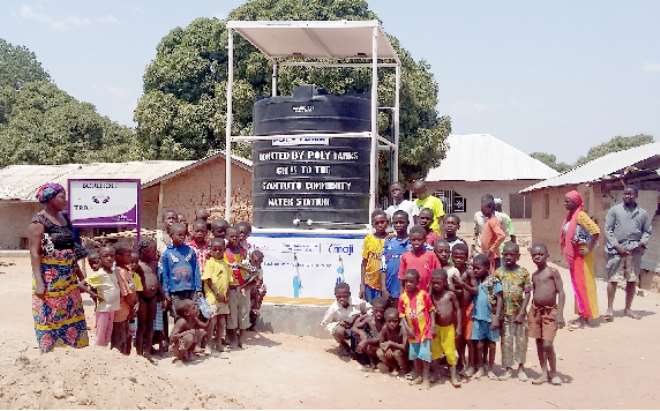
Water scarcity is one of the world’s leading problems affecting more than 844million people globally. Approximately 1 in 3 people worldwide lack access to safe, readily available water at home. Access to clean water continues to cause illness and stifle growth in emerging countries.
While Ghana has made progress, many communities still do not have access to safe drinking water.Many people in the rural communities still trek for 12 kilometers and more to search for water mostly from natural sources which are contaminated or not safe for humans.
In Ghana alone over 6 million people are currently living without basic access to water, according to WaterAid Ghana. Without water, decent sanitation and good hygiene, other Sustainable Development Goals, including those on gender equality, education, health, reducing inequalities and nutrition, cannot be achieved.
It is on this background that Project Maji, a non-for-profit foundation which was established in 2015 has provided over 15,000 Ghanaians access to safe drinking water using a new technology called Solar Water Kiosk. Project Maji is focused on creating sustainable access to safe drinking water in rural communities by replacing the old nerve-wrecking and painstaking hand-pump machines which exerts a lot of energy just gush out waterwith solar water kiosks which can pump and serve 5,000 liters of water per day with minimal maintenance and physical effort.
Mechanizing the Problem
Project Maji designed and developed a first of its kind solar powered kiosk pumping system. Its fit-for-purpose design is ideally suited for deployment in rural communities and is designed to work reliably with almost no maintenance in the harshest environments and minimal damage to the ecosystem. Using solar panels is not only sustainable; it’s also a practical solution as many communities do not have access to reliable electricity. Using a clean renewable energy source, the solar water kiosks have zero running cost and are not dependent on the electrical grid.
Reducing the burden and Saving Time
The features of Project Maji includes remotely monitored, solar technology, durable and affordable, generate safe drinking water from the ground, easy to install, up to 9 taps of water that can all be used at single time, no physical effort to collect water and more importantly, closer to homes, schools and community centers.
Increasing Access to 1million people by 2025
Project has opened nine sites in Ghana through partnership with numerous Ghana-based organisations such Binatone, Shalina, Volta River Authority (VRA), Melcom, Poly Group. Project Maji has signed a Memorandum of Understanding (MoU) with World Vision to create six additional sites particularly in schools, health centers and the communities.
Speaking at a press launch on the World Water Day Celebration, the Founder & CEO of Project Maji, Sunil Lalvani said the target is to reach 1million Ghanaians with 1000 sites by 2025.
He added that the cost of a solar water kiosk is US$10,000 which is almost the same price of the old hand pump and 50percent cheaper than any other mechanized pumping system.
“I originally set out to provide one community safe water through Binatone’s CSR Department in 2014 however, we continued to grow and expand to more communities and in 2015, Project Maji was founded,” MrLalvani stated.
The Development Director at Project Maji, Nicole Malick said they use a Build-Operate-Transfer (BOT) and sustain model for all of their projects and integrate environmental, financial and community sustainability into all aspects of what they do.

Community Management System and Maintenance
The Founder indicated that their new technology allows them to monitor all of their projects remotely directly from their cell phones.
He indicated that this not only mitigate costs but also ensures that each site remains functional well after they leave.
MrLalvani noted that his Foundation is committed to spending 100percent of its proceeds to expand and maintain rural water installations.
According to him, they will fix token that will be charged for fetching the water and shall be put aside into a fund for maintenance managed by the community members themselves before handing over after three years.
He added that in every community they train community leaders on how to maintain the kiosks for longevity.
Championing SDG Goal 6
Ghana’s vision to achieve universal access to basic water supply by 2025 through the strategic development plan (2012-2025) can be achieved based on the efforts of Project Maji of contributing to achieving the United Nation’s Sustainable Development Goals 6 in 2030.
Goal 6 which is ensuring access to water and sanitation for all indicates that clean, accessible water for all is an essential part of the world we want to live in. There is sufficient fresh water on the planet to achieve this. But due to bad economics or poor infrastructure, every year millions of people, most of them children, die from diseases associated with inadequate water supply, sanitation and hygiene.
According to SDG Goal 6, water scarcity, poor water quality and inadequate sanitation negatively impact food security, livelihood choices and educational opportunities for poor families across the world. Drought afflicts some of the world’s poorest countries, worsening hunger and malnutrition.By 2050, at least one in four people is likely to live in a country affected by chronic or recurring shortages of fresh water.







 We’ll protect state wealth from opaque deals – Prof Jane Naana
We’ll protect state wealth from opaque deals – Prof Jane Naana
 Mauritania president says running for second term in June polls
Mauritania president says running for second term in June polls
 I won't ever say I was a mere driver’s mate' — Prof. Opoku-Agyemang
I won't ever say I was a mere driver’s mate' — Prof. Opoku-Agyemang
 2024 polls: 'EC struggling to defend credibility'— Prof. Opoku-Agyemang
2024 polls: 'EC struggling to defend credibility'— Prof. Opoku-Agyemang
 Akufo-Addo gov't's 'greed, unbridled arrogance, unrestrained impunity, sheer dis...
Akufo-Addo gov't's 'greed, unbridled arrogance, unrestrained impunity, sheer dis...
 Election 2024: Ghana needs an urgent reset, a leadership that is inspiring – Ma...
Election 2024: Ghana needs an urgent reset, a leadership that is inspiring – Ma...
 Partner NDC to rollout a future of limitless prospects – Prof Jane Naana Opoku-A...
Partner NDC to rollout a future of limitless prospects – Prof Jane Naana Opoku-A...
 NPP will remain in gov’t till Jesus comes — Diana Asamoah
NPP will remain in gov’t till Jesus comes — Diana Asamoah
 Sunyani Technical University demands apology from former SRC president over sex-...
Sunyani Technical University demands apology from former SRC president over sex-...
 'Dumsor' was resolved by Mahama but ‘incompetent' Akufo-Addo has destroyed the g...
'Dumsor' was resolved by Mahama but ‘incompetent' Akufo-Addo has destroyed the g...
